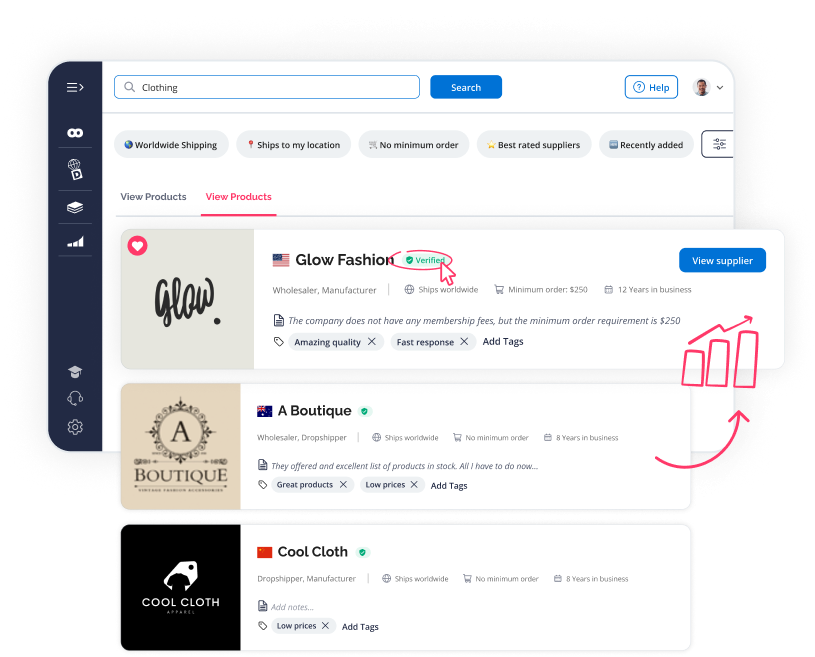Wholesale Baseball Caps Suppliers for Ecommerce Sellers
Baseball caps are a versatile accessory that blend style, functionality, and branding potential, making them a must-have for any retailer looking to expand their product range. With a wide variety of materials, designs, and customization options available, they cater to diverse markets, from sports enthusiasts to fashion-forward consumers. When sourcing suppliers, prioritize those with a proven track record for quality, sustainability, and prompt delivery to ensure your caps not only stand out in style but also meet customer expectations

Here’s a selection of suppliers waiting for your call
Dropship Supplier
 Verified
Verified
 Join to contact this supplier
Join to contact this supplier
 No Minimum Order
No Minimum Order
 34 Years in SaleHoo
34 Years in SaleHoo
Products stocked
About
Wholesale Supplier
 Verified
Verified
 Join to contact this supplier
Join to contact this supplier
 No Minimum Order
No Minimum Order
 25 Years in SaleHoo
25 Years in SaleHoo
Products stocked
About
Wholesale Supplier
 Verified
Verified
 Join to contact this supplier
Join to contact this supplier
 No Minimum Order
No Minimum Order
 10 Years in SaleHoo
10 Years in SaleHoo
Products stocked
About
Wholesale Supplier
 Verified
Verified
 Join to contact this supplier
Join to contact this supplier
 No Minimum Order
No Minimum Order
 6 Years in SaleHoo
6 Years in SaleHoo
Products stocked
About
Wholesale Supplier
 Verified
Verified
 Join to contact this supplier
Join to contact this supplier
 No Minimum Order
No Minimum Order
 4 Years in SaleHoo
4 Years in SaleHoo
Products stocked
About
Wholesale Supplier
 Verified
Verified
 Join to contact this supplier
Join to contact this supplier
 No Minimum Order
No Minimum Order
 1 Years in SaleHoo
1 Years in SaleHoo
Products stocked
About
Dropship Supplier
 Verified
Verified
 Join to contact this supplier
Join to contact this supplier
 No Minimum Order
No Minimum Order
 25 Years in SaleHoo
25 Years in SaleHoo
Products stocked
About
Wholesale Supplier
 Verified
Verified
 Join to contact this supplier
Join to contact this supplier
 No Minimum Order
No Minimum Order
 22 Years in SaleHoo
22 Years in SaleHoo
Products stocked
About
Wholesale Supplier
 Verified
Verified
 Join to contact this supplier
Join to contact this supplier
 $101 - $500
$101 - $500
 23 Years in SaleHoo
23 Years in SaleHoo
Products stocked
About
Manufacturer Supplier
 Verified
Verified
 Join to contact this supplier
Join to contact this supplier
 Ships worldwide
Ships worldwide
 No Minimum Order
No Minimum Order
 27 Years in SaleHoo
27 Years in SaleHoo
Products stocked
About
Other product suppliers available...
Trusted by 137,000+ entrepreneurs worldwide

7-day trial today
suppliers in the USA and internationally.
Frequently Asked Questions
Baseball caps are typically made from cotton, polyester, or blends for durability and comfort. Some may also include features like moisture-wicking fabrics or mesh panels for breathability.
The MOQ for baseball caps often ranges from 100 to 1,000 units, depending on the supplier's production capabilities and customization options. Lower MOQs may be available for ready-made designs.
Yes, many suppliers offer customization options including embroidery, screen printing, and heat transfer for logos and designs. It's important to verify the specific customization capabilities of each supplier.
Lead times for baseball caps can vary widely, but typically range from 2 to 6 weeks for production once the order is confirmed. Factors such as order size, customization, and supplier location can impact timing.
Implementing quality control measures such as sample approvals, onsite inspections, and testing for material compliance is crucial. Ensure your supplier has a clear quality assurance process to minimize defects.


